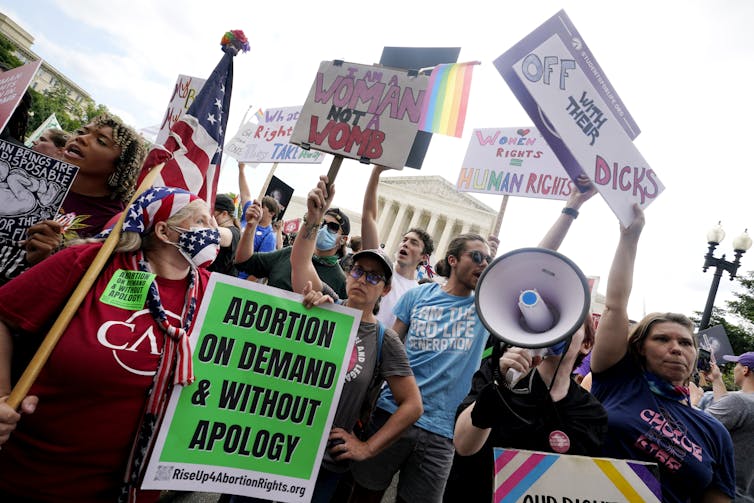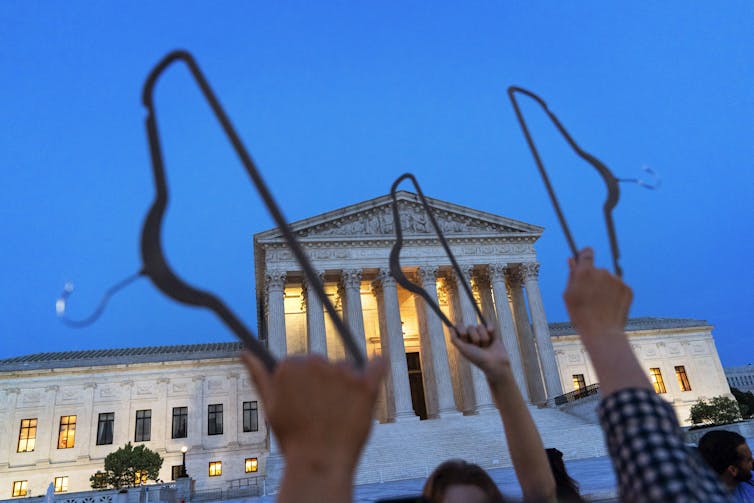Roe v. Wade overturned: Will more Americans travel to Canada and Mexico for abortions? - The Conversation
The United States Supreme Court has overturned Roe v. Wade, the landmark 1973 decision that guaranteed federal constitutional protections of abortion rights for American women.
For the countries that share a border with the United States, what will be the impact for Americans who want to travel to Mexico or Canada to get access to abortions?
First, American women will still need abortions and will seek them out. Abortion is a component of health care for women, along with other reproductive matters.
Second, abortion is a right, even if contested, and should be available without shame or risk.
Third, the ways in which women seek out abortion will be stratified, meaning achieved in different ways and according to a number of factors related to inequality. This will determine who crosses state or international borders to seek out abortions if unavailable in their own states.
This is the immediate and main outcome of the overturning of Roe v. Wade: a situation in which abortion is legal and accessible in some states and illegal and possibly criminalized in others.
Women will still seek abortions
Nonetheless, women will continue to require abortion regardless of what state they live in. Evidence shows that abortion bans don't stop the procedure, they just alter how people acquire it. They force women to find providers in other jurisdictions, to rely on medical abortion through internet sources — meaning that they'll purchase online the medication that can induce abortion and administer it themselves — or to seek out clandestine or illegal and unsafe procedures.
It's worth emphasizing that all sorts of pregnant people need and want abortions: young and old; poor and affluent; Black, Indigenous, racialized, white, people who are cis-gender, transgender or nonbinary; non-religious and religious; pro-choice and pro-life. Gloria Steinem's research even revealed that pro-life activists who picket outside abortion clinics sometimes get abortions in the same clinics they are protesting.
With the overturn of Roe v. Wade, and with access already seriously curtailed in many states, women have started to look to other jurisdictions for abortions.
Colorado, for example, reports a 1,000-per-cent increase in demand for abortion since the Texas abortion ban came into effect in September 2021. The law makes it almost impossible for women to access abortion in Texas.
By way of contrast, Colorado has guaranteed the right to abortion and made the state a safe haven for women throughout the U.S.

State bans expected
In a post-Roe v. Wade political landscape, approximately half of American states are expected to ban or severely restrict abortion.
This means women could travel to the remaining 25 or so states for abortions. But this isn't so easy. Some states have already threatened surveillance and travel restrictions for the purpose of getting an abortion, and travel is expensive and invasive. Not all women will be able to pick up and leave for another state.
For women on the southern U.S. border, Mexico will be a preferred option because they already cross the border regularly for medical and dental services or other kinds of exchanges and purchases.
Access to medical abortions is easy and cheap in Mexico, although there are reasons to be concerned about information and oversight. A medical abortion requires two drugs, mifepristone and misoprostol. The first can be purchased in a pharmacy in Mexico; the second requires a prescription from a doctor.
There is concern that women will only acquire the first medication and forego the second, and will not receive proper care for the entire procedure.
Slipping across the border into Mexico is familiar, anonymous, inexpensive, quick and carries with it no surveillance or judgment. This is a good option for many women, especially those who are poor, racialized and/or particularly vulnerable to state surveillance. But the removal of constitutional protections for abortion will create a stratified reproductive rights regime, in which women will be forced to make choices based on their social positions.
Travel across state borders might be easiest for the most privileged women who are the least concerned about state surveillance and control; these are women who are not poor, racialized, vulnerable or under threat.

Travelling to Canada for abortions
Travel to Canada requires a passport, planning, time, money and medical management of the procedure. There are also relatively few abortion clinics in Canada, and there are concerns that they're already at capacity and demand would soon outpace the ability to provide services.
Some of the states that would likely outlaw abortion — Michigan, North Dakota and Idaho among them — border rural parts of the provinces of Ontario, Manitoba, Saskatchewan and British Columbia.
This means demand might increase in the areas that are already struggling to provide abortion in underserviced and overstretched areas. And Americans who will pay out of pocket for abortions might increase wait times and further restrict access for rural, northern and Indigenous women.

Justin Trudeau's government has welcomed American women to Canada and ensured that Canadian Border Services will permit entry, but there are still a lot of important details to sort through.
Would women have to declare their intention to have an abortion or could they state that they were going to visit a reproductive health clinic? What level of deeply sensitive personal information needs to be revealed to the border services agent?
Who will come to Canada — which women, which pregnant people? — and why is a matter of speculation at this point. But we can be certain there will be an increase in demand from across the border, that it will put pressure on the Canadian system, that the drug combination used in medical abortions will be increasingly scarce or hard to access and that stratified reproduction rights will be revealed and replicated.
The Trudeau government has been impressive regarding its rhetorical commitments to feminist foreign policy, gender equality and sexual and reproductive rights at home and abroad, but has often failed to achieve gender justice.
With the reversal of Roe v. Wade, let's hope Canada is ready to honour its commitments to reproductive health and rights for women on both sides of the border.



Comments
Post a Comment